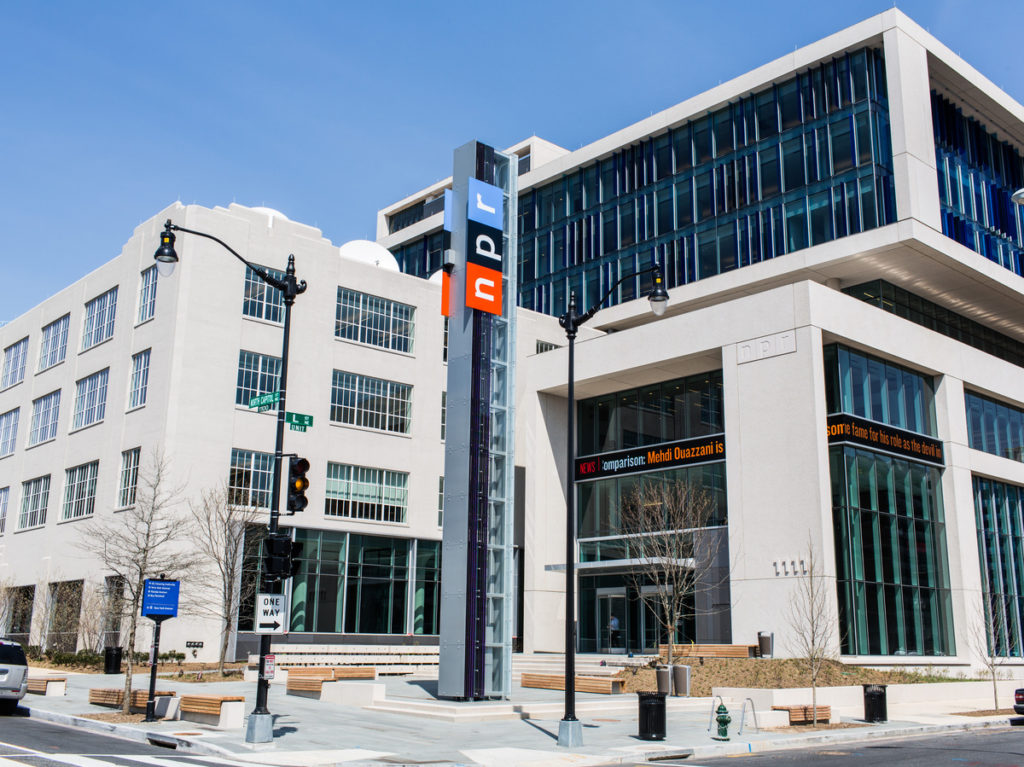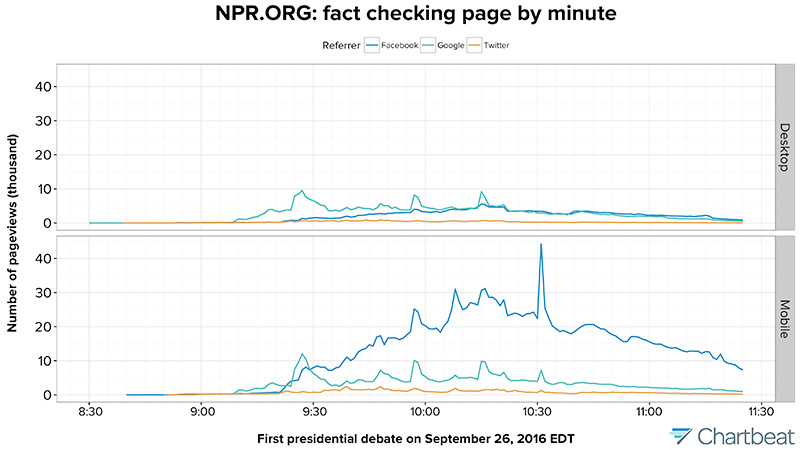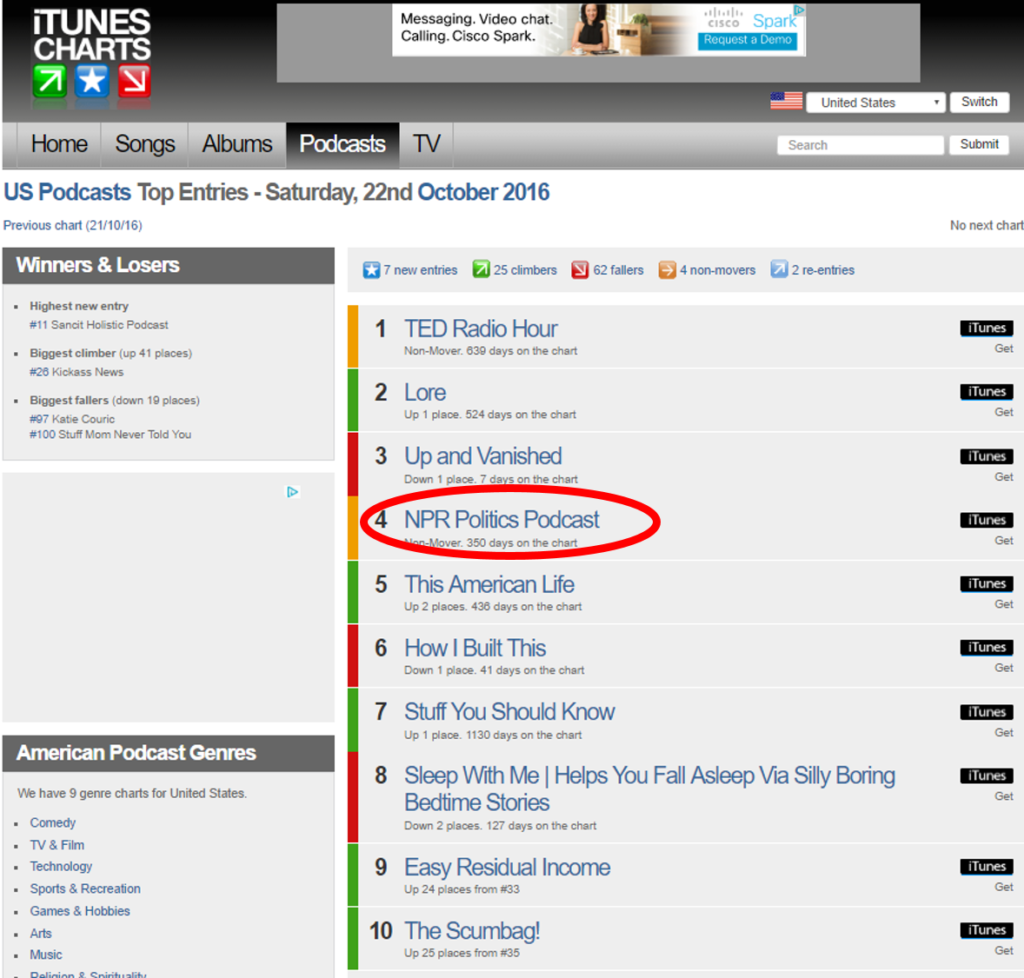
Last week, NPR did something very uncharacteristic – it bragged about its ratings. A press release, “NPR See Large Ratings Increase,” made the point that NPR’s (and by extension, public radio’s) ratings jumps go well beyond a hot election and a politically overheated climate.
President/CEO of NPR, Jarl Mohn, has been especially vocal about his network’s progress, noting that while the Trump/Clinton “battle of the century” has obviously been a catalyst for some of the growth, NPR’s new magazines have experienced increases well beyond what commercial news radio has enjoyed during the same period.
As he noted, “These increases confirm that there is a real appetite for factual reporting, and people are turning to NPR as their source for credible news.”
So the pundits will debate whether these gains will be transitory (as they often are for cable news channels during big news stories), ebbing and normalizing when the election fires diminish. Or whether NPR specifically, and public radio globally, will experience an afterglow into 2017.
There are at least two reasons to believe these gains are not only real, but sustainable. Apart from the improved Nielsen listenership, NPR is seeing sharp traffic increases on its digital media channels, spearheaded by the fact-checking initiative that went into effect for the Presidential and VP debates.
We’ve talked about NPR’s unique debate team coverage, blending technology with journalism expertise, in a post that ran shortly after the first debate. During that event, NPR.org broke traffic records. As the Columbia Journalism Review noted, this initiative didn’t just happen – NPR spent months preparing for its debate coverage, conducting test runs of the process during both parties’ conventions to ensure the system worked.
But the CJR also notes another healthy sign – Facebook growth for NPR. I can tell you that after conducting 12 Techsurveys in commercial radio and eight in public radio, it’s no social media contest. Public radio traditionally lags behind its commercial counterparts in the social space. Now some of public radio’s deficit in the social space may be due to sheer demographics – the public radio audience skews older – but it’s also true the very nature and tone of Facebook, in particular, may be more congruent with commercial radio sensibilities.
But a look at NPR’s fact-checking web results show that, in fact, Facebook was the key traffic driver. As the CJR story points out, Facebook directed 2 million+ page views to NPR’s online fact-checking coverage.
While search and Twitter contributed, the Chartbeat graph below shows the Facebook blue line referrals throughout the first debate.

One of the most positive signs is that while there were peaks during some of the debate’s biggest and most controversial moments, that huge spike at 10:30 pm came immediately after the debate as consumers gathered at NPR.org to review the event themselves through the network’s fact-checking activity. Impressively, this traffic was organic – NPR bought no Facebook ads nor was there a particular post that drove it.
Overall, NPR and public radio have embraced digital media. NPR, in particular, has been very proactive about is presence in “connected cars.” The NPR One app is another great example of melding content with technology. But perhaps the other piece of the puzzle that explains NPR’s growth spurt is podcasts. Public radio has led the league in podcasting for years, frequently on the strength of its “replays” of popular programs like “This American Life” and “Fresh Air.”
As Mohn pointed out in his release, NPR’s “Politics Podcast” (launched less than a year ago) typically averages around 450,000 downloads each week. In early October, it went well above 1 million. The podcast continues to maintain a high ranking on the iTunes chart every week.
 Like most success stories, it’s rarely just one thing – it’s usually a confluence of several factors that come together. That appears to be the case for NPR and most public radio operations. Stations across the system are seeing significant Nielsen ratings increases.
Like most success stories, it’s rarely just one thing – it’s usually a confluence of several factors that come together. That appears to be the case for NPR and most public radio operations. Stations across the system are seeing significant Nielsen ratings increases.
NPR’s senior director of promotion and audience development, Izzi Smith explained it to Adam Ragusea on the Current’s “The Pub” podcast this way:
“At the end of the day, people make a choice about when they’re going to listen, how often they’re going to listen, and whether or not they’re going to tell their friends based on the experience they have listening to the radio. If it’s a rewarding experience, human behavior tell us they might just do it again. The intention of all of our promotional efforts is to remind them and encourage them to do it again. At the end of the day, the experience has to be a good one; we have to provide something of value.”
Now I know some people outside public radio will point to the specter of government funding, arguing that if commercial radio received subsidization, these same success stories would be impacting stations on the other side of the aisle. You could argue that the relaxation of consolidation rules and other regulations these past two decades amounts to some of the same governmental advantages. But the reality is that much of this public radio progress is clearly due more to its mission-based approach than monthly checks coming from Uncle Sam.
As it happens, we published top-line findings for Public Radio Techsurvey 8 last week, and many of the findings echo perceptually what Mohn and NPR are seeing in the ratings, as well as social and podcasting analytics. We’ll take a look at some of the salient data from PRTS8 tomorrow.
Disclosure: We work with NPR and several public radio stations and program producers.
- The Hazards Of Duke - April 11, 2025
- Simply Unpredictable - April 10, 2025
- Flush ‘Em Or Fix ‘Em?What Should Radio Do About Its Aging Brands? - April 9, 2025




Take chapter & verse from NPR & Commercial Radio Experience and you get financially successful Full Service Radio of The Future! WNPR-FM, Connecticut’s Public Media: Content, Presentation, Class, Connection and Local Information!
Many thanks, Clark!